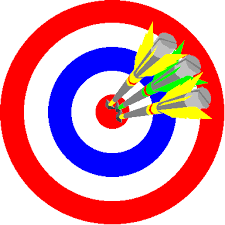 Bunge (BG)
Bunge (BG) is a global agri-business and food company with operations that extend from the farm field to the retail store and encompasses the world.
They make their profits by producing and selling fertilizer to farmers; buying, handling and selling oilseeds and grains; crushing oilseeds to make meal and oil for the livestock and food processing industries; and producing edible oils and related products for foodservice customers and consumers.

Bunge is also:
* The world's largest oilseed processor
* The world's largest seller of bottled vegetable oil to consumers and a leading supplier of premium edible oils to the U.S. foodservice industry
* The world's largest corn dry miller
* The largest manufacturer and seller of fertilizer and a leading supplier of animal feed in Brazil
* The largest exporter of soy products to Asia
* A leading bio-diesel producer
Processed soybeans are the largest source of animal feed and edible oils in the world. Global soybean consumption has increased 4.5% per year over the past 10 years and shows no signs of slowing. As people around the world eat healthier,
Bunge is there to supply them with lots of healthy, great-tasting food made from the world’s most versatile and popular agricultural product.

The versatility of soy has put
Bunge on the map. Soybean Oil is the most abundant and one of the least expensive vegetable oils in the world. It has a variety of functional benefits, and is a favorite among food processors, foodservice providers and restaurants. Its relatively high flash point, about 620°F, makes it ideal for cooking, and its emulsifying properties improve the texture and consistency of baked goods.
Soybean meal is an important component in animal feed. Its high protein content — between 44 and 49 percent — and amino acid profile make it an ideal supplement to the primary low-protein, high-energy feed fed to poultry, hogs, dairy cattle and farm-raised fish.
Bunge has joined forces with
DuPont (DD) to produce a low-linoleic soybean oil that should meet the demand for reduced and zero trans fat products in the US and other parts of the world. However, new labeling requirements from the USDA require food processors to disclose levels of trans-fatty acids in their products. Bunge could see sales of edible oils falter in 2006 as the rules take effect.
With over 80% of the world's soybean crop grown in the Americas, and the largest demand coming from Europe and Asia, Bunge has positioned itself to be a low-cost provider in the industry.
%2520Fertilizer%25202ok.jpg) Bunge
Bunge is South America's top producer of fertilizer and is the only supplier with vertically integrated operations. In places like Brazil, where the soil is inherently deficient in key nutrients, farmers are forced to purchase fertilizer to realize profitable crop yields. Controlling five of the six main phosphate mines in Brazil gives
Bunge a significant leg up on competitors, who are forced to import this key fertilizer ingredient. While the fertilizer division accounts for just 10% of
Bunge's annual sales, it generates close to 40% of its profits.
4th quarter results are in with sales up 8% @ $6.7 billion and net income up 42% @ 149 million over same period last year. They closed on February 14th at $56.85. This is up over $1.00 from yesterday’s close. Their 52 week high came on July 19, 05 @ $67.99. Their 52 week low came on Oct. 27th @ $46.65.
Their Chairman & CEO Alberto Weisser, said: "In 2005, our principal problems stemmed from a weak operating environment in Brazil. Farm economics deteriorated due to a drought, lower soybean prices and a steadily appreciating Brazilian real estate. Farmers reacted by withholding crop sales and delaying purchases of farm inputs. The real estate appreciation affected
Bunge directly, primarily by raising local costs and squeezing margins. Fertilizer inventory purchased earlier in the year was sold later at a stronger real-U.S. dollar exchange rate, pressuring dollar margins”.
"In 2006 we will stay focused on growth and efficiency. This year we intend to create a stronger link to customers in China by purchasing a second soybean crushing and refining plant in that country. We will bring two new crushing plants in Spain, replacing less efficient assets” reported Weisser.
They also plan to open a new Russian plant by the end of 2006. They expect it to supply their domestic bottled oil business with much better profit margins.
All indications are that
Bunge's business fundamentals are strong. The agricultural market does experience fluctuations just like every other business. Can you and
Bunge benefit from the goodness of Soybeans and its many by products??




 Robert W. Weaver, President of
Robert W. Weaver, President of 

 The versatility of soy has put
The versatility of soy has put %2520Fertilizer%25202ok.jpg)
